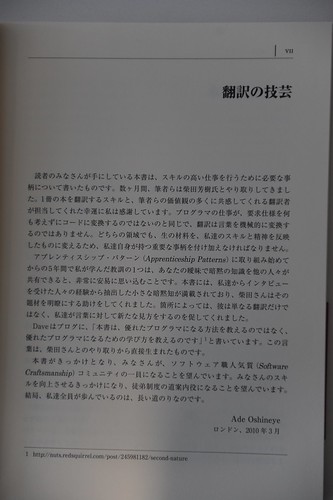People are often surprised when they discover that Dave Hoover and I have only met twice. Yet, somehow, over the course of 4 and a half years we put together this book. People seem to like it.
Dave and I have never met Yoshiki Shibata but somehow we all put together this book. I hope people like it.
As part of the translation process I wrote a new foreword and last week I got to see it in print for the first time. Since I can't even guess at the meaning of Kanji symbols I had to infer the meaning from memory. Seeing my own words in a language I couldn't understand generates the strangest feeling of alienation.
I thought I'd share something of that feeling. You can read the English and Japanese versions of the foreword below. Hopefully those of you who can read both languages will better appreciate the craft of translation after seeing both versions.
The craft of translation
This book you're holding in your hand is about what it takes to do skilled work. In the months we've worked with Yoshiki Shibata I've come to appreciate the skill involved in translating a book and how lucky we are to have a translator who shares so many of our values. Translation is not a matter of mechanically converting words any more than a programmer's job consists of mindlessly converting requirements into code. In both disciplines we must add something of ourselves in order to transmute the raw materials into something that reflects our skill and our spirit.
One of the lessons I've learned in the five years since we started working on Apprenticeship Patterns is that it's really easy to assume that other people share a lot of your obscure and tacit knowledge. Our original version of the book is full of little bits of tacit knowledge that we've extracted from the experiences of our interviewees and Shibata-san has helped us make that material clearer. In some places he has gone beyond mere translation and helped us see our words in new ways.
As Dave has blogged: http://nuts.redsquirrel.com/post/245981182/second-nature this book "won’t teach you how to be a great programmer, it will teach you how to learn to be a great programmer." That phrase was directly inspired by our conversations with Shibata-san.
I hope that this book will inspire you to become part of the Software Craftsmanship community. I hope that it will inspire you to improve your skills and I hope that it will guide [you] on to the path of apprenticeship. After all that's the long road we're all walking.

Add comments on Buzz
Dave and I have never met Yoshiki Shibata but somehow we all put together this book. I hope people like it.
As part of the translation process I wrote a new foreword and last week I got to see it in print for the first time. Since I can't even guess at the meaning of Kanji symbols I had to infer the meaning from memory. Seeing my own words in a language I couldn't understand generates the strangest feeling of alienation.
I thought I'd share something of that feeling. You can read the English and Japanese versions of the foreword below. Hopefully those of you who can read both languages will better appreciate the craft of translation after seeing both versions.
The craft of translation
This book you're holding in your hand is about what it takes to do skilled work. In the months we've worked with Yoshiki Shibata I've come to appreciate the skill involved in translating a book and how lucky we are to have a translator who shares so many of our values. Translation is not a matter of mechanically converting words any more than a programmer's job consists of mindlessly converting requirements into code. In both disciplines we must add something of ourselves in order to transmute the raw materials into something that reflects our skill and our spirit.
One of the lessons I've learned in the five years since we started working on Apprenticeship Patterns is that it's really easy to assume that other people share a lot of your obscure and tacit knowledge. Our original version of the book is full of little bits of tacit knowledge that we've extracted from the experiences of our interviewees and Shibata-san has helped us make that material clearer. In some places he has gone beyond mere translation and helped us see our words in new ways.
As Dave has blogged: http://nuts.redsquirrel.com/post/245981182/second-nature this book "won’t teach you how to be a great programmer, it will teach you how to learn to be a great programmer." That phrase was directly inspired by our conversations with Shibata-san.
I hope that this book will inspire you to become part of the Software Craftsmanship community. I hope that it will inspire you to improve your skills and I hope that it will guide [you] on to the path of apprenticeship. After all that's the long road we're all walking.

Add comments on Buzz
No comments:
Post a Comment
Note: only a member of this blog may post a comment.